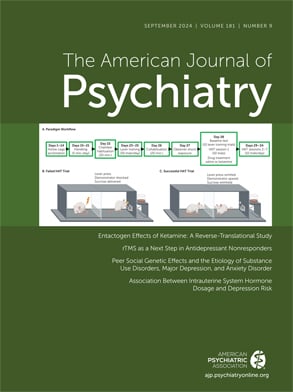To the Editor: We want to reply to the important comments of Dr. Speranza et al., who suggest including a dimensional measurement of depression as an additional independent variable in regression analyses predicting the psychopathological dimensions of the SCL-90-R. They argue that the “difficulties identifying feelings” subscale of the Toronto Alexithymia Scale and the ratings of depression have especially been shown to be correlated with each other alexithymic features and psychopathology.” First, because alexithymia is conceptualized as a personality construct demonstrating a high relative stability (Luminet et al., 2001), our intention was to assess the association between alexithymia and psychopathology, with adjustment for personality dimensions (the Temperament and Character Inventory) that have been shown to explain up to 45% of the variance in alexithymia
(1). Second, our data show that depression (beta=0.32) is not only associated with alexithymia but also with a broad range of psychopathologic dimensions, including anxiety (beta=0.41) and somatization (beta=0.44). Thus, anxiety or somatization could also act “as a strong mediator between alexithymia and psychopathology.” Third, one has to decide a priori whether actual psychopathology is the dependent variable or a confounder within the model.
Ignoring these three statements, we followed the statistical recommendation of Dr. Speranza et al. Unfortunately, we do not have dimensional information on depression other than the depression subscale of the SCL-90-R. Given the high internal consistency of the SCL-90-R, each subscale, e.g., depression, entered as a confounder will show major statistical effects on the dependent variable, which is also an SCL-90-R subscale in our model. Thus, when we entered depression, the three Toronto Alexithymia Scale factors, the Temperament and Character Inventory, age, and gender as independent variables and the SCL-90-R global severity index (without items assessing depression) as an dependent variable into a hierarchical linear regression model, SCL-90-R depression resulted in R
2=0.785 and difficulties identifying feelings added an additional R
2chg=0.030 (F
chg=41.3, p<0.001) to the variance. However, it is important to consider that the correlation (Pearson) between SCL-90-R global severity index (without depression) and the depression subscale was r=0.89! Thus, the adjustment of a statistical model for, e.g., depression is more reasonable if the confounder variable is not as highly correlated with the dependent variable. This was done by Luminet et al. (2001) in predicting posttreatment scores for alexithymia with pretreatment scores of alexithymia with adjustment for scores for depression or by Grabe et al.
(1) when they predicted alexithymia with Temperament and Character Inventory dimensions with adjustment for the SCL-90-R global severity index.

